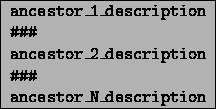



Next: Output Files
Up: Input Files
Previous: Parameter specification (params.ini)
If the parameter ancestor is set to
user_defined, Cosmos looks in the
ancestor.ini file for a description of the ancestor(s) to be
used to inoculate the environment at the beginning of the run. The
format of this file is shown in Figure A.3.
Figure A.3:
Format of the ancestor.ini file.
 |
Any number of different ancestors may be specified, each separated by
the line ###. If multiple ancestors are defined in this
file, they are introduced alternately into the environment during
inoculation, until the specified total number of organisms has been
reached (see the description of the parameters number and
placement in Section A.1). Each
ancestor description is a consecutive sequence of lines, each of which
may be any one of the following:
- 1.
- A blank line.
- 2.
- A comment (commencing with the % character).
- 3.
- An explicit bit string to be directly added to the ancestor's
genome. Specified by a line consisting of a string composed of the
characters 0 and 1. Useful for specifying
binding patterns.
- 4.
- An instruction (as listed in Section A.2). This
has the effect of writing the bit string corresponding to the
instruction (as defined in the file genetic_code.ini)
to the ancestor's genome.
- 5.
- An instruction enclosed in square brackets
[]. This has the
effect of determining a sequence of nop instructions
(i.e. taken from the set nop_00,
nop_01, nop_10, and
nop_11) corresponding to the bit string representation
of the specified instruction. The bit string representation of this
string of nops is then written to the ancestor's
genome. Useful for writing code that will produce regulators which
will bind to a particular sequence of instructions (without
requiring the programmer to know the bit string representation of
these instructions).
- 6.
- A promoter to be added to the ancestor's promoter store. Specified
by a line beginning with p: followed by a string
composed of the characters 0 and 1
representing the promoter's bit string.
- 7.
- A repressor to be added to the ancestor's repressor store. Specified
in same way as promoter, but with line starting r:.
- 8.
- An initial energy level for the ancestor. Specified by a line
beginning with e: followed by a number to represent the
desired energy level.
- 9.
- An initial flaw period for the ancestor. Specified by a line
beginning with f: followed by a number to represent the
desired flaw period.
A valid ancestor description consists of at least one instruction and
one promoter. If no initial energy level or flaw period are specified,
the default values defined by the parameters
default_ets_level_of_ancestor and
default_flaw_period, respectively, are used. If
multiple ancestors are defined, they are distributed alternately across
the environment, as described in Section A.1 under
the description of the placement parameter.




Next: Output Files
Up: Input Files
Previous: Parameter specification (params.ini)
Tim Taylor
1999-05-29
